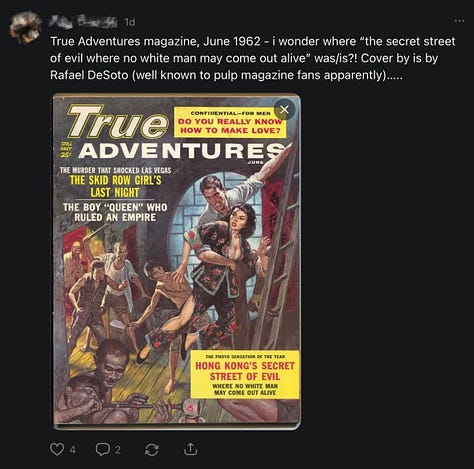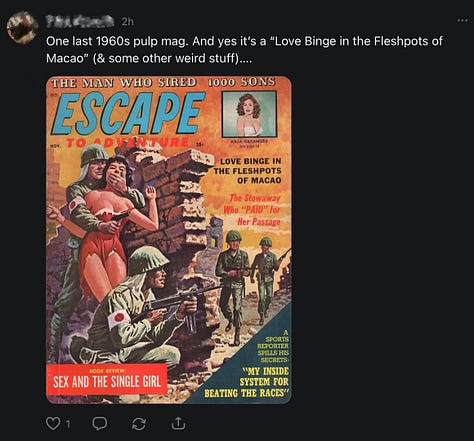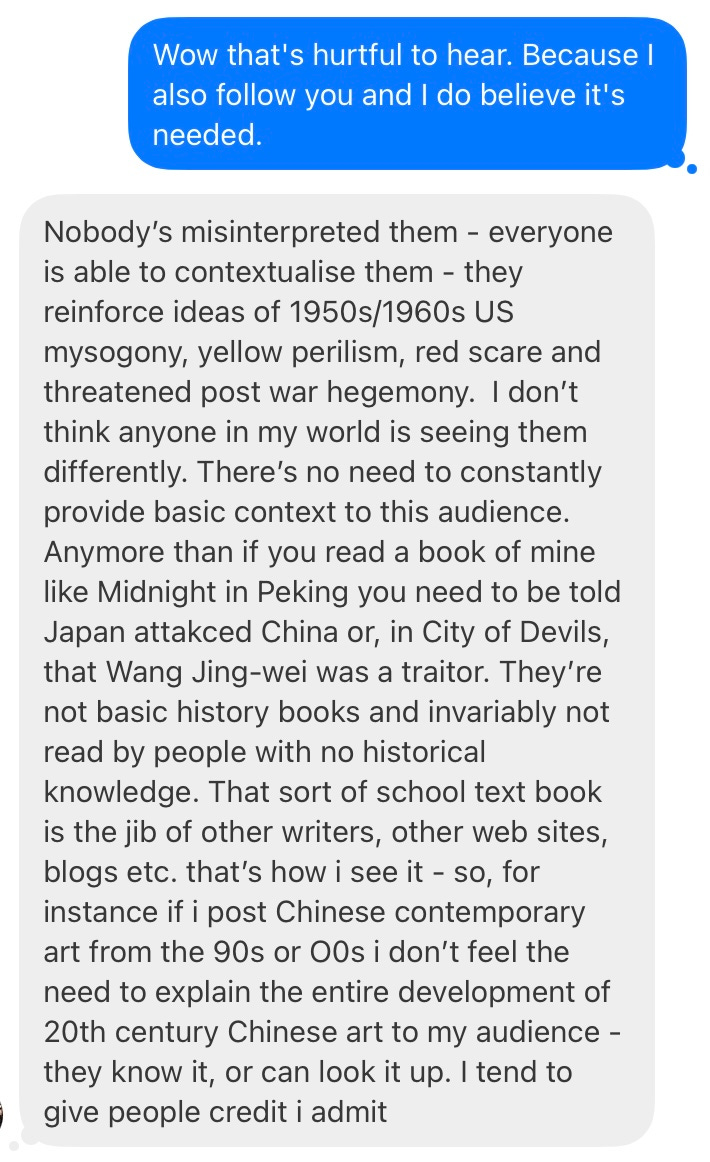Sorry I'm Asian
What happens when an Asian woman decides to speak up, and still isn't heard.
Note on May 25: An update.
Last Thursday, my desk neighbor at my London co-working space turned up, sharing her dating life, as per usual.
“I went out with someone whose ex was Chinese. I said I’ll introduce you to a girl at the office if it doesn’t work out,” she said. She’s European and in her mid-30s.
“Oh, because I’m Chinese?” I said with a wry smile. This usually works and stops them. And I expected her to say, “No, of course not.” And we’d laugh together, and I could go back to finishing my dull accounting tutorial on YouTube.
But that’s exactly what she meant.
“You know, guys who’s dated Asian girls would always go for Asian girls,” she continued. “It’s not a bad thing.”
I widened my eyes, looked over at another woman who shared the three-desk row with us. We exchanged looks. The one in the middle would not stop telling me why it’s good.
That’s when the imaginary nerve in my brain snapped. “I’ve worked on my identity for so long; I’m not here to listen to you how I should enjoy being fetishized. The conversation should end here.” I then swiveled my chair back.
The girl on the side texted and asked if I was ok and if I wanted a chat. I said yes, as we walked to the kitchen, the women followed us, “you raised your voice at me, which is embarrassing... You took it the wrong way.”
I said, loudly and firmly: “This is not about you, and don’t tell me how I should feel.” I stormed off back to my chair. I’m in no mood to learn about accounting anymore, and now I can’t stop thinking about being an Asian woman.
Following the office incident, when I scrolled on Substack Notes yesterday, and saw the following posts by the author and book editor— one after another — I felt immediately triggered, and upset at how someone deemed a public figure could share them.
He wasn’t condemning what this is portraying, not saying that the exposed, half-naked girls (is the one in the middle being raped?), truly made me deeply uncomfortable.



This is the message I sent to him:
Hi XX,
I didn't expect this to be my first message. I respect you and your work very much, and I’d been thinking about reaching out to discuss potential book ideas. But I'm writing today to express that I was shocked and deeply uncomfortable to see that you're sharing old magazine covers that reinforce the stereotypes and prejudices against Asian women.
It was difficult to see three half-naked (and, I believe one in the background was fully naked) ladies in your separate posts. I wondered if you intend to show how far we’ve come as a society, but I’d also like to point out that you were sharing without context, which leave them open for misinterpretation as if you are to promote them.
It was, in fact, more difficult to decide to reach out as I didn’t want to make you uncomfortable or jeopardize the potential of future conversations. But I decided to speak up, because I’d like to believe that you haven’t thought about what an Asian woman might think, and that deserves to be acknowledged.
I’m curious to hear your thoughts.
Best,
Yaling
He replied, essentially saying that that his audience doesn’t need them:
Yaling - i assume the people that follow me fully understand the context of pulp magazine covers of the 1950s and 60s particularly given my recently published work on tropes concerning Hong Kong and Macao and long body of work concerning “yellow peril” representations and stereotyping.
I don’t think I need to preface any of this and am not about to provide lectures to my audience who are, I think, an intelligent bunch who don’t need them.
Again, in a split second I thought: why do I even exist? Why do I even feel the way I feel?
More conversations happened since last Thursday between me and the women (let’s call her A)— essentially through an intermediary. I never called it racism, it’s such a strong word. Yet, the people I recounted the story to told me it was. It was hard to reconcile — I haven’t been physically attacked, I’ve stood up for myself, I don’t want to be seen as a victim. Yet, I am.
When I spoke to the owner of the co-working space about this, he felt distressed (his eyes looked red), because he’d never had to deal with this over the last five years.
I felt sorry — my existence and speaking up tainted the business’ history. Truth be told, if no Asians existed in the space, no one would be hurt. The predominantly non-Asian group would let it go or just thinks she’s “insensitive” if she ever makes offhanded comments.
But speaking up is something I only learned to do in recent years. And it’s a battle I choose to fight, because I’m not just fighting for myself.
Having grown up in China, I never felt that my voice mattered. It continued to not matter when I entered the world of translation and journalism. (In the latter, I’m not legally allowed to work for foreign publications as a staff member with byline credit.)
The micro-aggressions kept creeping up and I keep brushing them off. I needed to fit in and play by the rules, not make more enemies. As a freelancer, I became a victim of ‘sexpat journalists’ while in China. Of course, I only realized years after.
It sounds silly to say that it was actually Twitter that helped me find my voice.
Although I no longer use it, I remember feeling pleasantly surprised to see that some of my posts resonated. But it was also on Twitter where I observed how me and other women are treated. My LinkedIn profile was cropped by a state media article to show that we, Chinese women by nationality or blood, tend to overpower men in what we do. The piece asked: Why do Chinese women want to work for foreign media so much? The Australian journalist Vicky Xu was stripped bare in sexually explicit cartoons, resulting in PTSD around any sexual behaviors for years, as she wrote herself.
Today, a few days have passed after the office incident, I saw A in the morning. She smiled and asked if she could have a moment with me. She wants to apologize—she’s sorry I feel this way.
This really isn’t an apology. It’s a repetition of her belief that I took it the wrong way.
Finding myself not being able to be in her presence, I chat to the owner again about moving, at least for now. His eyes weren’t red (thankfully). He reiterated the house rule of “no discrimination” and said he wants to do what aligns with the right values. It’s not the first time she’s offended a social group in the office, after all.
That gives me confidence that things can change after one speaks up.
Apparently, not everywhere. After I sat down at a different desk in the co-working space, I saw the writer’s new response to me expressing surprise:
What is truly hurtful is that he kept referring to “nobody” and “everyone”.
But I am right there — a person and casualty of the very thing he helps dissect and record — saying I am hurt, giving him the benefit of the doubt.
I haven’t read any of his books. I’m simply telling him how it might be interpreted because people do lack context. I’m not, for the record, calling what he does is racist, I’m disappointed.
As life tells me, I’m the one left dealing with the real consequences of things being taken out of context.
I wanted to attend his book talk and discuss about book ideas with him, not that he cares. But I remember feeling taken aback about the venue: a place called The Oriential Club.
I felt like I’d immediately turn into an artifact when I walk through that door, or an object to be studied. (A bit of context for American readers: the University of Oxford only changed the name of its Faculty of Oriental Studies to the Faculty of Asian and Middle Eastern Studies in 2022 to avoid “potential offense”. You can still see many many Chinese restaurants branding themselves as oriental in the U.K.)
I looked up the membership rates and options and realized it’s not for me. It’s a space for people to reinforce their social status and class. Why would they listen to a member of the public who’s not in their circle? Why would the writer listen to someone who’s not his intended audience (who’s probably not an Asian woman)?


The reality is, Asian women need to keep fighting for themselves, because they don’t expect anyone else would do it for them. More often than not, Asian women don’t speak up — and when they do, their feelings are dismissed.
Would the institution feel the need to be less offensive for non-majority groups and non-paying members? No. Would bystanders feel the need to call people out? No. Because it doesn’t hurt them. It’d would be commendable if they did — but they are not responsible.
I’m sorry to be Asian. Sorry to feel offended. And sorry to be Asian and not “intelligent” enough to know the author’s whole life’s work, to not see what everyone else apparently does, except me.
Today, I feel drained, physically and emotionally.
Maybe another day, I will gather myself up and champion what platforms like my own (People’s Square) and NuVoices represent, and why we do what we do. That day is not today.
Today, I just feel sorry that I’m Asian. 🔚
[The header image was taken as part of a photography project that supports Against Violence to Overseas Chinese Women at Asian Women Development Plan International; http://awdpi.org]
About us: Following the Yuan is a reader-supported publication that aims to deliver real-time insights about Chinese consumers from native Chinese experts. As the founder of the newsletter, I also write personal essays on this platform, here are some other issues I explored.



living in a white country as a minority is a traumatic experience.
i did a degree in migration studies just to heal, like a form of mental therapy, lol. i spent a year digging through all the explanations about race, gender, culture, just trying to make sense of the pain.
people always tell us to suck up the injustice, but really, we shouldn’t.
thanks for speaking up
Yaling, I'm black, male & a baby boomer and experienced many such encounters with Europeans that typically end with "I'm joking", if challenged or silence if ignored by me. I applaud your energy, commiserate with your fatigue and encourage you to continue speaking out. With over 50 years of experience I can assure you there is no fitting in bc even if you try, "A" will pull you out with microagressions that would exhaust an elephant. Good luck and live your life.